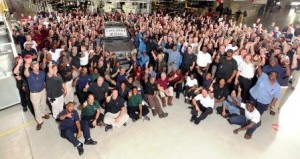
Workers at the Tuscaloosa Mercedes plant celebrating the production of the millionth M-Class. Will they vote for the UAW?
Daimler AG is facing new pressure about opening its Mercedes-Benz assembly plant in Alabama up to the long-stalled organizing efforts of the United Auto Workers Union. The big difference is that the maker’s German unions seem ready to throw their hefty support to their struggling U.S. colleagues.
The UAW has been increasingly desperate to organize the so-called “transplant” assembly lines since Honda first landed in the U.S. a quarter-century ago. It has been an all but fruitless challenge complicated by the expansion of those non-union foreign-owned facilities while the organized operations of Detroit’s Big Three have steadily declined in size and employment.
Cracking into the transplants has become the top priority for Bob King, the current UAW president – and could be a make-or-break effort for a union losing both political clout and cash. But until recently, most of the emphasis has been on Japanese-owned plants, Nissan in particular. Now, however, the Germans are in the spotlight.
As TheDetroitBureau.com recently reported, a top representative of Germany’s IG Metall sitting on the Volkswagen board has called for a vote that could result in UAW representation at VW’s new plant in Chattanooga, Tennessee. The same may soon happen with the Daimler plant near Tuscaloosa, Alabama.
(German union wants to see UAW at VW’s Tennessee plant. Click Here for the story.)
So far, Daimler’s position has been to remain neutral at a corporate level, according to officials who asked to remain anonymous. The company does not want to get tangled up in controversy with the U.S. National Labor Relations Board.
However, the UAW has quietly has been lobbying the German Metalworkers union to support its organizing drives in the U.S. With the European automotive sector under pressure to reduce capacity and jobs, IG Metall is taking another look at the operations of German companies in the Southern United States and openly backing the UAW efforts to organize workers in the non-union plants across the U.S.
The effort was kicked off last month when IG Metall representatives at Volkswagen, including a members of the company’s supervisory board have come out in favor of United Auto Workers representation in Chattanooga in a letter that was distributed to workers at the plant in Tennessee. Union representatives sit on the supervisory boards of German companies and have a critical role in setting company policy.
The letter was sensitive enough that representatives from VW actually alerted Daimler AG representatives of the content of the text before it became public. “The UAW is looking for a beachhead in the South and they think they may have got one at Chattanooga,” observed one Daimler official familiar with the exchange. “They also want to expand to Spartanburg, South Carolina (where BMW has a plant) and to Tuscaloosa,” he added.
Workers at the Volkswagen AG plant in Chattanooga, Tennessee, will decide whether they want union representation, a ranking executive in North America said recently.
The pro-UAW letter surprised VW’s American-based management, which remains dead set against letting the UAW anywhere near the plant, according to one close observer, who asked not to be identified but closely has watched the UAW attempt to organize workers at other plants in the South over the years.
Daimler is gearing up to expand the Tuscaloosa plant, which now builds three different sport-utility vehicles, by adding production of the next-generation C-Class, Mercedes’ most important model, starting in 2014. Daimler is also planning to add a fifth model, a new SUV, that would slip in between the M-Class and GL models now built at Tuscaloosa.
Daimler AG’s relationship with its key German union appears to have grown more tense in recent weeks.
Dieter Zetsche, Daimler’s top executive, told the company’s shareholders this week that the company was in the midst of a broad cost-cutting campaign that will trim the company’s expenses by more than $2.7 billion. “We are striving to improve our cost position on a sustained basis by the end of 2014. We plan to achieve one-third of those improvements already this year,” he said.
It was widely reported in Germany that Wolfgang Bernhard, the former head of production at Mercedes-Benz was moved to another executive position as head of Daimler’s truck division after showing an unwillingness to compromise with the union on some key issues.
However, Manfred Bischoff, chairman of the supervisory board, insisted during the shareholders meeting Bernhard was shifted to the truck division to give him broader experience. Shareholders, though, were clearly skeptical.
Even with the support of the influential German metalworkers union, the UAW faces an uphill battle across the South. For example, morale and wages at the Tuscaloosa plant are very high and there hasn’t been any inkling employees are thinking of joining a union, Daimler officials noted.

It’s very simple really. If a company treats it’s employees properly and with respect then Unions are rarely needed or imposed. If however the company constantly exploits it’s employees and treats them as if they are just a means to an end, then Unions usually arise to balance the relationship. Life pretty much is defined as ye sow, so shall ye reap.